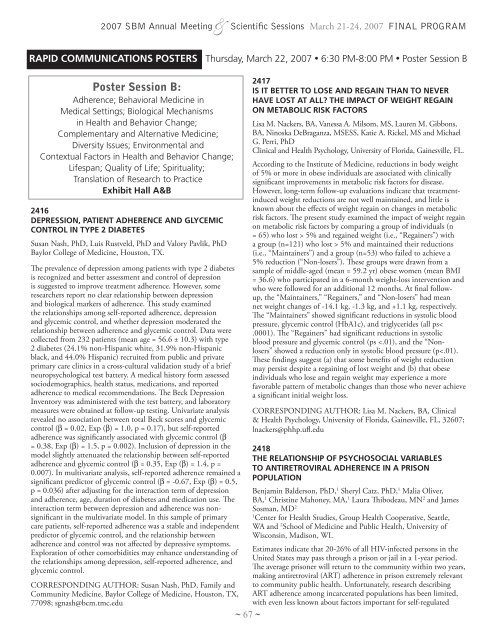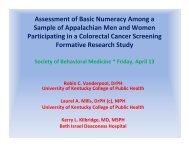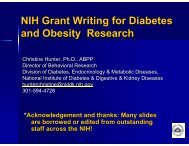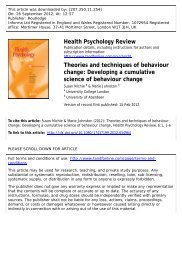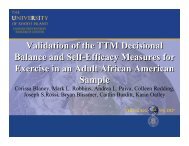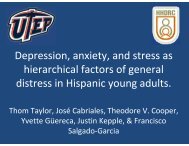2007 Final Program - Society of Behavioral Medicine
2007 Final Program - Society of Behavioral Medicine
2007 Final Program - Society of Behavioral Medicine
You also want an ePaper? Increase the reach of your titles
YUMPU automatically turns print PDFs into web optimized ePapers that Google loves.
<strong>2007</strong> SBM Annual Meeting & Scientific Sessions March 21-24, <strong>2007</strong> FINAL PROGRAM<br />
Rapid Communications Posters Thursday, March 22, <strong>2007</strong> • 6:30 PM-8:00 PM • Poster Session B<br />
Poster Session B:<br />
Adherence; <strong>Behavioral</strong> <strong>Medicine</strong> in<br />
Medical Settings; Biological Mechanisms<br />
in Health and Behavior Change;<br />
Complementary and Alternative <strong>Medicine</strong>;<br />
Diversity Issues; Environmental and<br />
Contextual Factors in Health and Behavior Change;<br />
Lifespan; Quality <strong>of</strong> Life; Spirituality;<br />
Translation <strong>of</strong> Research to Practice<br />
Exhibit Hall A&B<br />
2416<br />
DEPRESSION, PATIENT ADHERENCE AND GLYCEMIC<br />
CONTROL IN TYPE 2 DIABETES<br />
Susan Nash, PhD, Luis Rustveld, PhD and Valory Pavlik, PhD<br />
Baylor College <strong>of</strong> <strong>Medicine</strong>, Houston, TX.<br />
The prevalence <strong>of</strong> depression among patients with type 2 diabetes<br />
is recognized and better assessment and control <strong>of</strong> depression<br />
is suggested to improve treatment adherence. However, some<br />
researchers report no clear relationship between depression<br />
and biological markers <strong>of</strong> adherence. This study examined<br />
the relationships among self-reported adherence, depression<br />
and glycemic control, and whether depression moderated the<br />
relationship between adherence and glycemic control. Data were<br />
collected from 232 patients (mean age = 56.6 ± 10.3) with type<br />
2 diabetes (24.1% non-Hispanic white, 31.9% non-Hispanic<br />
black, and 44.0% Hispanic) recruited from public and private<br />
primary care clinics in a cross-cultural validation study <strong>of</strong> a brief<br />
neuropsychological test battery. A medical history form assessed<br />
sociodemographics, health status, medications, and reported<br />
adherence to medical recommendations. The Beck Depression<br />
Inventory was administered with the test battery, and laboratory<br />
measures were obtained at follow-up testing. Univariate analysis<br />
revealed no association between total Beck scores and glycemic<br />
control (β = 0.02, Exp (β) = 1.0, p = 0.17), but self-reported<br />
adherence was significantly associated with glycemic control (β<br />
= 0.38, Exp (β) = 1.5, p = 0.002). Inclusion <strong>of</strong> depression in the<br />
model slightly attenuated the relationship between self-reported<br />
adherence and glycemic control (β = 0.35, Exp (β) = 1.4, p =<br />
0.007). In multivariate analysis, self-reported adherence remained a<br />
significant predictor <strong>of</strong> glycemic control (β = -0.67, Exp (β) = 0.5,<br />
p = 0.036) after adjusting for the interaction term <strong>of</strong> depression<br />
and adherence, age, duration <strong>of</strong> diabetes and medication use. The<br />
interaction term between depression and adherence was nonsignificant<br />
in the multivariate model. In this sample <strong>of</strong> primary<br />
care patients, self-reported adherence was a stable and independent<br />
predictor <strong>of</strong> glycemic control, and the relationship between<br />
adherence and control was not affected by depressive symptoms.<br />
Exploration <strong>of</strong> other comorbidities may enhance understanding <strong>of</strong><br />
the relationships among depression, self-reported adherence, and<br />
glycemic control.<br />
CORRESPONDING AUTHOR: Susan Nash, PhD, Family and<br />
Community <strong>Medicine</strong>, Baylor College <strong>of</strong> <strong>Medicine</strong>, Houston, TX,<br />
77098; sgnash@bcm.tmc.edu<br />
~ 67 ~<br />
2417<br />
IS IT BETTER TO LOSE AND REGAIN THAN TO NEVER<br />
HAVE LOST AT ALL? THE IMPACT OF WEIGHT REGAIN<br />
ON METABOLIC RISK FACTORS<br />
Lisa M. Nackers, BA, Vanessa A. Milsom, MS, Lauren M. Gibbons,<br />
BA, Ninoska DeBraganza, MSESS, Katie A. Rickel, MS and Michael<br />
G. Perri, PhD<br />
Clinical and Health Psychology, University <strong>of</strong> Florida, Gainesville, FL.<br />
According to the Institute <strong>of</strong> <strong>Medicine</strong>, reductions in body weight<br />
<strong>of</strong> 5% or more in obese individuals are associated with clinically<br />
significant improvements in metabolic risk factors for disease.<br />
However, long-term follow-up evaluations indicate that treatmentinduced<br />
weight reductions are not well maintained, and little is<br />
known about the effects <strong>of</strong> weight regain on changes in metabolic<br />
risk factors. The present study examined the impact <strong>of</strong> weight regain<br />
on metabolic risk factors by comparing a group <strong>of</strong> individuals (n<br />
= 65) who lost > 5% and regained weight (i.e., “Regainers”) with<br />
a group (n=121) who lost > 5% and maintained their reductions<br />
(i.e., “Maintainers”) and a group (n=53) who failed to achieve a<br />
5% reduction (“Non-losers”). These groups were drawn from a<br />
sample <strong>of</strong> middle-aged (mean = 59.2 yr) obese women (mean BMI<br />
= 36.6) who participated in a 6-month weight-loss intervention and<br />
who were followed for an additional 12 months. At final followup,<br />
the “Maintainers,” “Regainers,” and “Non-losers” had mean<br />
net weight changes <strong>of</strong> -14.1 kg, -1.3 kg, and +1.1 kg, respectively.<br />
The “Maintainers” showed significant reductions in systolic blood<br />
pressure, glycemic control (HbA1c), and triglycerides (all ps<<br />
.0001). The “Regainers” had significant reductions in systolic<br />
blood pressure and glycemic control (ps


